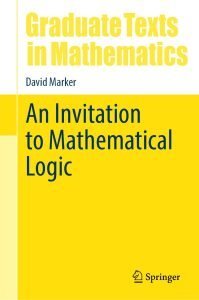Book note: Marker, An Invitation to Math. Logic, IV
 Part IV of Marker’s book, ‘Arithmetic and Incompleteness’ is the longest, at over 100 pages, but I’ll be briefer.
Part IV of Marker’s book, ‘Arithmetic and Incompleteness’ is the longest, at over 100 pages, but I’ll be briefer.
The first chapter, Ch. 13 on the incompleteness theorems, is reasonably accessible, though for various reasons it wouldn’t be my recommendation for a place to start on the topic; still, this could provide useful follow-up reading for beginners.
Ch. 14 is on Hilbert’s 10th problem. We don’t get quite a full proof of the MRDP theorem, with all the dots joined up; but this is pretty clearly done, I think, and so without too many tears you’ll get a decent sense of what is going on. However, the nice book in the AMS Student Mathematical Library by Murty and Fodden is still clearer, more inviting, and indeed more complete: I’d read the appropriate sections of that instead.
Ch. 15 is titled ‘Peano Arithmetic and  ’. This long chapter aims at a proof of the Kirby-Paris theorem that Goodstein’s Theorem is unprovable in PA. As Marker himself clearly acknowledges with thanks, the line of argument follows closely an unpublished piece by Henry Towsner. I think you’ll want to read Marker’s chapter and Towsner’s piece in tandem — Marker is clearer, e.g., about the Hardy hierarchy of fast-growing functions, Towsner is perhaps clearer about what’s going on with the Schütte-style infinitary deduction system for arithmetic on which the overall proof turns. This two-pronged approach should then work well, and I think this is the chapter of Marker’s book that I found the most helpful addition to the literature.
’. This long chapter aims at a proof of the Kirby-Paris theorem that Goodstein’s Theorem is unprovable in PA. As Marker himself clearly acknowledges with thanks, the line of argument follows closely an unpublished piece by Henry Towsner. I think you’ll want to read Marker’s chapter and Towsner’s piece in tandem — Marker is clearer, e.g., about the Hardy hierarchy of fast-growing functions, Towsner is perhaps clearer about what’s going on with the Schütte-style infinitary deduction system for arithmetic on which the overall proof turns. This two-pronged approach should then work well, and I think this is the chapter of Marker’s book that I found the most helpful addition to the literature.
The shorter final Ch. 16 is titled ‘Models of Arithmetic and Independence Results’. After a section on provably total functions of PA, the chapter dashes on to establish the unprovability in PA of the Paris-Harrington Principle in Ramsey Theory. So there is some speedy setting-up of context, and then a dense proof. Then the discussion rushes on to a number of other results in the model theory of PA (Gaifman’s Splitting Theorem, Bounded Recursive Saturation, Tennenbaum’s Theorem). We are back, then, to topics tackled at pace. Almost anyone who wants to understand this material will be much better off working through Kaye’s approachable — indeed, one might say, particularly inviting — book Models of Peano Arithmetic.
Summary verdict? Overall I’m disappointed. Marker’s book has its moments, but it too often provides a bumpy, breathlessly fast, ride — so it is not so much the promised introduction, as a book that can be mined for supplementary/more advanced reading on some of its topics.
The post Book note: Marker, An Invitation to Math. Logic, IV appeared first on Logic Matters.



